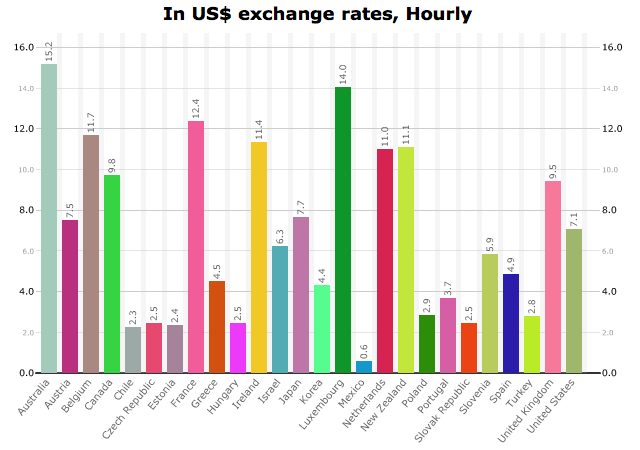In between Lionel Davidson’s cracking 1994 thriller – recently reissued – [amazon_link id=”0571324215″ target=”_blank” ]Kolymsky Heights[/amazon_link] and Colum McCann’s moving novel [amazon_link id=”0812973992″ target=”_blank” ]Let the Great World Spin[/amazon_link], I read (at last) Martin Ford’s [amazon_link id=”0465059996″ target=”_blank” ]Rise of the Robots: Technology and the Threat of a Jobless Future[/amazon_link]. It’s good to see it made the FT Business Book Prize long list, amid terrific company.
[amazon_image id=”0465059996″ link=”true” target=”_blank” size=”medium” ]Rise of the Robots: Technology and the Threat of a Jobless Future[/amazon_image]
As one of the economists Ford has a go at in the book, I don’t believe the challenge is one of the total number of jobs jobs. These periodic waves of concern about where all the jobs are going to come from tend to prefigure a wave of job creation. It happened in the 1960s, following publication in 1964 of the ‘Triple Revolution’ report in the US, and it happened again in the 1990s after the [amazon_link id=”0812928504″ target=”_blank” ]’Downsizing of America'[/amazon_link] report in 1992. This time might be different, as Ford and so many others argue, but repeatedly over 250 years capitalist economies have shown their capacity for creating new forms of work when old forms become redundant for technological or other reasons.
Indeed, at present in the US and UK there is little sign of any direct impact of automation at all. Employment rates are high, and low labour and total factor productivity signal the absence of a significant technological impact on growth and jobs. We have too few robots, not too many. There are some significant data issues here, but that includes the question of measuring jobs in the digital economy – as often noted, Google has far fewer employees than GM, but Mike Mandel has pointed out that the statistics are not counting the extent of job creation in smaller businesses.
That’s not to say there are no challenges from robotisation. Almost as often as they have adapted, capitalist economies have proven themselves bad at the process of transition. The huge wave of automation in manufacturing in the 1980s and 1990s, the deindustrialisation and globalisation, destroyed communities and left successive generations out of work, in poverty, and scarred by the nexus of social problems experienced by so many former mill or mining towns. There is also the question of income distribution. As Ford points out, [amazon_link id=”B00I2WNYJW” target=”_blank” ]Thomas Piketty’s tome[/amazon_link] on inequality hardly mentioned technology amid its quotations from [amazon_link id=”0192835696″ target=”_blank” ]Balzac[/amazon_link] and [amazon_link id=”0747549079″ target=”_blank” ]Austen[/amazon_link], but it did plant this issue firmly at the centre of policy debates. Tony Atkinson’s impressive book [amazon_link id=”0674504763″ target=”_blank” ]Inequality[/amazon_link] had a detailed list of policy responses. The winners from technology will need to share the benefits if our societies are to thrive.
So I certainly don’t dismiss techno-fears, but I do think “we’re all going to be unemployed” is the wrong way to frame the problems. Having said that, [amazon_link id=”1480574732″ target=”_blank” ]Rise of the Robots[/amazon_link] is a thorough review of the impact of digital technologies on a number of areas. It covers the likely breakthroughs such as AI and driverless vehicles, going over the exponential pattern as Brynjolfsson and McAfee do in their book [amazon_link id=”B00D97HPQI” target=”_blank” ]The Second Machine Age[/amazon_link]. Ford has chapters on industries such as health and higher education, where the impact of digital disruption has yet to be experienced.
He raises some interesting questions. For example: “Should the population at large have some sort of claim on [the] accumulated technological balance?” Meaning the vast social and public investment in research and innovation, on which the new digital fortunes are piggybacking. The answer to that is surely yes. There is also the implication of the machines’ greater ability to know what we know: no human an be aware of all research, past or present, but something like IBM Watson can be.
There is a great example in the book of two almost simultaneous cases of patients presenting themselves at different hospitals with mysterious diseases. One almost died during a heart operation, the doctors puzzled as to the diagnosis. Another was correctly diagnosed and treated because the doctor happened to have seen the same mystery symptoms on the TV series House. A smart enough computer would have known without having to have serendipitously watched the right TV programme. Ford seems to see this as a threat, but surely there is only benefit in this ability to pool past human knowledge? And I’m not persuaded that computers are yet anywhere near creating new knowledge however magical they are at collating and making sense of past knowledge. They are standing on the shoulders of human giants, absorbing humanity’s existing intellectual assets.
Well, maybe I’m delusionally optimistic. Ford ends the book with figures from the BLS. Between 1998 and 2013, there was a 42% real increase in US GDP, but no increase in the total hours worked. He thinks that’s a bad thing. I think it’s a good one – with the huge proviso that the benefits of growth must be widely shared. They haven’t been. We don’t have the people’s robots. That’s the real problem.

